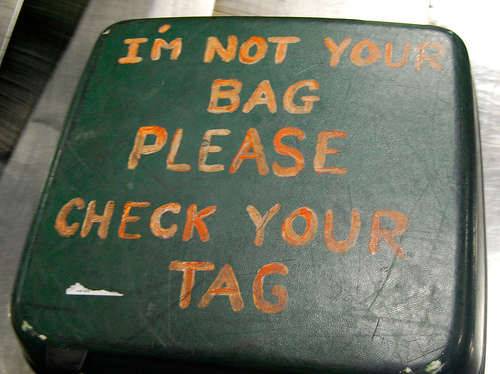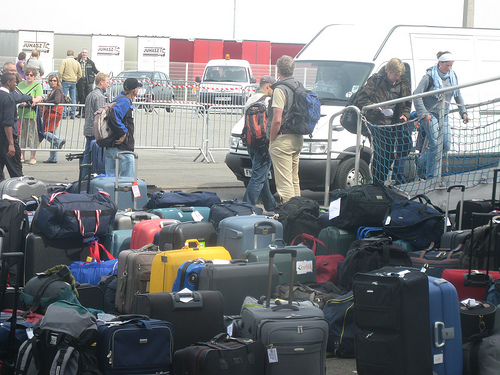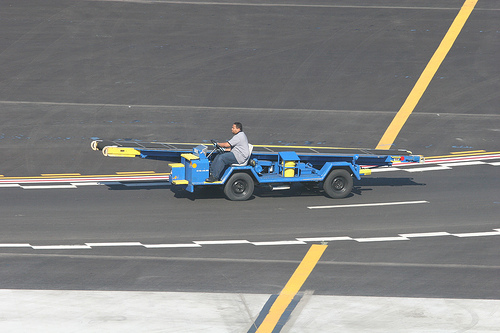
Lost Luggage, by tymesynk (Creative Commons)
This is the second half of the two-part “Where is my luggage?” series.
So, you decided it’s time to get out the passport, dust off the large bag, and leave the country for a couple of days or weeks. And then Murphy decided to make things interesting, and now your luggage has a different itinerary than you. Even though it is enjoying itself sunning on a beach in the Bahamas right now, it would be nice if you could be reunited with your bags, right?
I can’t promise that you’re going to get reunited with your bag. What I can promise is that the phone and the internet are about to become a larger part of your trip. But here are a few tips that might help get you out of the jam.
Got your passport? Okay, let’s see what we can do…
Carry on baggage
You can always tell the seasoned traveler from the newbie on an international flight. First, the seasoned traveler has three bags. One is their business luggage of some sort. The other is the suitcase they checked underneath the plane. The third – and this is what distinguishes them – is the overnight bag they packed with just enough to survive.
A small duffel bag can hold enough clothing for a few days, as long as you pack just right. Put your toiletries in this bag, several changes of socks and underwear, and something clean to wear once you get off the flight. Remember to pack for the destination – if it’s going to be warm, put the shorts in your carry on bag. And always bring your prescription medicine in your carry on. Because the ulcer medication won’t do you any good if you lose the bag you packed it in.
Finally, be sure to make two copies of your itinerary. The first should go in your packed luggage. Bring the second copy with you on board, so that if you have to take a different flight or need information, it’s right there so anyone can read it. After all, who remembers their reservation code?
Checked Luggage
International luggage is heavy. Very, very, heavy. Most people pack suitcases weighing in at a metric ton or more, so you can expect that your bag will get put under a lot of very heavy stuff. Keep that in mind when packing, because those glass bottles might not fare well.
The real problem with heavy luggage is the baggage allowances on most international domestic flights. On a recent trip to Australia, I found that Virgin Blue (the Southwest of Australia) had a luggage limit of 23 Kilos (or 50 pounds). My international luggage weighted a lot more than that, so I got hit with a bunch of fees. Check all the airlines you are using on your trip, and if you must pack two bags instead of one. (I would say pack lighter, but who am I kidding?)
And don’t forget to tape a luggage card to the inside of your luggage. Include the phone number you have with you, if your phone supports international calling.

Luggage, by Du-Sa-Ni-Ma (Creative Commons)
Lost Luggage
The luggage carousel keeps going around and around, but your bag just refuses to come out and meet you at your destination. So, what should you do next?
US Carrier
If you flew the same airline all the way to your destination, the first thing you should do is file a lost luggage report with that airline. Did you keep your baggage check tag? Because you are going to need it. Someone also recommended taking a cell-phone picture of your bag before you left, and that can’t hurt either. Just make sure you fill out the form completely, and get all of the tracking information from them about your bag.
Airlines have internal tracking systems that they use for tracking lost luggage. These are the first line of defense, and the airline (and usually it’s best partners) will have an extensive system they use for finding lost bags. It’s just like domestic travel, using the same codes and has the same dial in numbers. Since your international, make sure to get the local baggage tracking office number, so you won’t have to call back to the US to find out what happened. (And remember, most US operators don’t have a clue about international travel, so the local office is your best bet.)
Before you walk away, make sure and get the name of the person who took your report. And try to get the local number of the office at the airport – because sometimes they see things that the computer doesn’t. It can’t hurt.
United Ground Luggage Conveyor, by planephotoman (Creative Commons)
International Carrier (WorldTracer)
Most international carriers have thier own baggage tracking systems. But a number of those airlines have started to use IATA‘s WorldTracer program. WorldTracer is the international version of the baggage tracking system, and it is used by multiple airlines to serve the world-wide community. Some airlines will give you a WorldTracer number (which is 5 letters and 5 numbers) as well as a company specific tracking number. Be sure to identify which is which – you’ll need to know what to give people when they ask for information.
If you get a WorldTracer number (for example, ABCDE12345), you can use the global tracking site to get information on your bag. You can also use the airlines web site to track information (as I found when flying Monarch airlines, a low cost UK carrier). Sometimes one will have information that they other can’t find. Use as many as you can find, and get as much information as you can.
There is a benefit to WorldTracer. No matter what airline finds your bag, it is routed as “airline independent”. That means any carrier at the airport will attempt to put it on a flight towards its destination. That’s good – the bag is following you. It’s also really bad, because many airlines scan bags as the enter the plane – but they DON’T scan WorldTracer bags. So it’s exact routing may be a mystery until it lands in the US.
Although many of the international carriers have heard of WorldTracer, if you get back to a United States airport things can get really insane. Most baggage agents don’t deal with a lot of international luggage. Worse, the limited training they get only covers the airline lost luggage systems, not WorldTracer. Don’t be discouraged. When you go to a US airport, don’t wait for anyone. Ask for the supervisor or the “international expert” when you get to the counter. Explain, politely, that your bag is lost on international travel. The normal agents will then route you to one of the few people who will “get it” and be able to start helping you. (I attempted to give a WorldTracer number to a regular baggage agent in San Francisco, and it caused an hour of confusion, so I know this one from personal experience.)
If you have trouble finding someone from your airline who understands the international situation, there are a few sneaky workarounds. First, most domestic carriers have international partners. Find the luggage office for an international partner (any partner will do, at this point). The people in that office will have a lot more experience with international luggage, and they may be able to help you when the normal luggage office can’t do anything.
Finally, if your luggage didn’t make your flight, check back in 24 hours. Often luggage that “missed” the first flight is pushed in to the same routing the next day. It is worth it to stop at the airport the next day and check in. I found a piece of luggage that way, long before the luggage office “discovered” it and called me.
How Much Do You Get
Here is the $64,000 question. If you lose your luggage on an international flight, you will get a quick trip through the Warsaw convention on lost items overseas. Here is how it works: luggage is valued at the weight of the suitcase, at US $20.00 per kilo (about $9 a pound). That’s a LOT less than the usual $2,500 you get for domestic baggage. So a 75 lbs bag (34 kilos) would get $680.00 back. That’s nothing.
I said it before for domestic, but for international this is really true: BUY INSURANCE. Make sure your insurance covers your bags, lost items you picked up along the way, and costs for buying clothes in route. It’s your only hope of recovering something if your bag goes missing. American Express offers travel insurance, and they have offices in most major countries where you can file a claim (and get help). But shop around, as you can find better deals if you look.
I love international travel. Getting to see places that have thousands of years of history, unique skylines, and amazing people are just some of the rewards of having a well used passport. And the with the dollar making a resurgence, it’s time to start making overseas plans! Take a few simple precautions, and you won’t remember your international trip as the one where you spent all your time on the phone.
We love to travel (from DC) will be published every other Wednesday (except when the author is on the road and can’t get the Internet connection to work – like this week!) Please email suggestions to jonebaker
at we love dc dot com.

Um, a slight correction to your post:
“First, the seasoned traveler has two bags. One is their business luggage of some sort. The other – and this is what distinguishes them – is the carry-on bag they packed with just enough to survive.”
You keep forgetting that real seasoned travelers never check their bags. Ever.
If you have to check, then ship your bags separately.
Here are some thoughts on this subject and the reply above. Please forgive me if I sound like a wise guy. I really do not mean to.
I will say that I am a seasoned traveler. And, although I prefer to not checking my bags, sometimes necessity overrides preference. This is why:
– Shipping is quite expensive and not necessarily better than check in. For instance, on my last trip, a co-worker shipped business materials that the hotel never found, although the delivery service confirmed they had left them there.
– It is also too difficult to live out of a small plastic bag of 3 oz. toiletries for 3 weeks and/or to carry all of my clothes and camera equipment in the carry-on size bag. In many countries, it is just not practical to purchase all of your basics when you arrive.
I love how your opinion is the only “right” opinion, Wayan.
Every time this comes up Wayan states his position and every time I am amazed that some people would rather struggle with
* lugging a heavy bag all the way through the airport
* finding space in the overhead bins
* living without whatever personal item the TSA has banned that week OR buying it at inflated prices once you reach your destination
Sure, if I’m going somewhere for 3 days that’s one thing. But otherwise I’ll have a leisurely stroll through most of my traveling and listen to my iPod for 10 minutes while I wait for my bags to unload.
I have lost suitcases in international travel before. It sucks. Everything was eventually returned but in the meantime it really, really sucked and the airlines said they would not give me anything for my inconvenience to buy things like toiletries. It sucked.
I’m still amazed that y’all over pack so badly. Two weeks in Africa, a carry on. Six weeks in Africa and Europe, a carry on.
How’s that possible? Washing machines. They clean your clothes quick and easy like. You only need to pack for about a week. After that, you wash and wear again.
Travel insurance can also help when your bags go astray – some offers a baggage delay benefit where you can be reimbursed for purchases you have to make while waiting for your bag and the help lines have much more experience and local contacts (and in some places speak the language where you might not). If you travel a lot, annual travel insurance (I have it) covers you all year long instead of buying for individual trips.